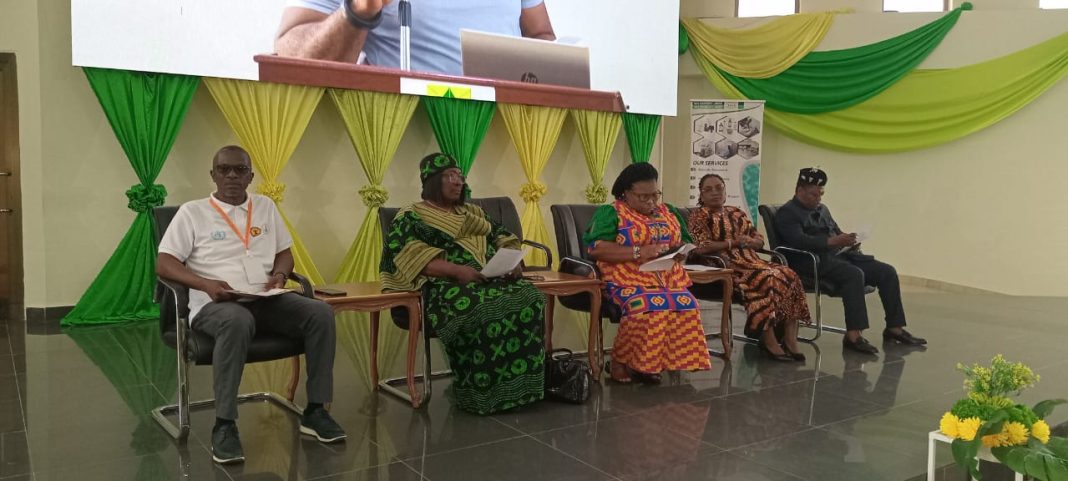By Maxwell Awumah
Ho, Nov. 9, GNA – Mr. Kwabena Mintah Akandoh, Minister of Health, has affirmed the critical role of traditional and alternative medicine in Ghana’s healthcare system, describing it as both a heritage and a national asset.
In a speech delivered by for him by Dr. Anastasia Yirenkyi, Director of the Ministry’s Traditional and Alternative Medicine Directorate, Mr. Akandoh highlighted that traditional medicine has long served as the primary care source for many, especially in underserved communities.
He noted that about 70 per cent of Ghanaians currently rely on traditional or complementary medicine.
Speaking at the closing and certificate award ceremony for 268 practitioners of the Ghana Federation of Traditional Medicine Practitioners Association (GHAFTRAM), who participated in the Professional Practice Course, organised by the Institute of Traditional Medicine (ITAM), under the auspices of the University of Science and Allied Sciences (UHAS) in Ho on Friday.


Mr. Akandoh emphasized the Ministry’s commitment to integrating and regulating the sector.
He said the Professional Practice Course, a model for capacity building, is a pioneering national initiative and directly responds to the Ministry’s policy framework on traditional and alternative medicine development.
He said the programme equipped practitioners with fundamental knowledge and improves their competencies in one clinical assessment and patient management, laboratory interpretation and good manufacturing and quality assurance practices.
He cited the establishment of over 55 herbal units in public hospitals and a strategic partnership with India’s Institute of Education and Research to promote academic exchange and global standards.
The Ministry’s strategy includes regulation, quality assurance, research, practitioner training, and alignment with Ghana’s Universal Health Coverage goals.
Dr. Fiona Brakah of WHO Country Director, represented by Dr. Angela Ackon, noted that 80 per cent of Africa’s population depends on traditional medicine.
She praised ITAM and GHAFTRAM’s efforts but acknowledged challenges such as unregistered practitioners and lack of formal training.
She said the WHO supports initiatives to professionalize the sector and expand access in rural areas.
She emphasized a call to action to include expanding carbon-neutrality initiatives, attract more practitioners nationwide and across Africa and collaborate with the Ministry of Health, FDA, and other agencies to embed traditional medicine into national health policies.
Others are to strengthen partnerships with academic institutions to document the health impacts of traditional medicine and contribute to global knowledge and leverage community trust to promote health education, disease prevention, and early detection outcomes.
Prof. Lydia Aziato, UHAS Vice Chancellor, stressed the need for structured training and integration of indigenous knowledge with modern diagnostics.
She said ITAM races to plug the void for structured training, certification, and integration of health assessments to improve traditional medicine practices, efficacy and quality assurance.
She assured that continuous learning would lead to diploma certification and encouraged practitioners to take advantage of the opportunities.
Prof. Kwame B. N. Banga, ITAM Director, recounted the institute’s milestones, including the FDA-certified ITAM Natural Product Laboratory and the Professional Practice Course, and now planning to expand the module to accommodate Francophone countries.
He emphasized that ITAM is now seeking WHO designation as a collaborative hub for traditional medicine and called for sustained financial and institutional support.
GHAFTRAM’s General-Secretary Nana Obiri Danso lauded the training’s impact on ethics, documentation, and patient care, urging practitioners to uphold high standards.
He commended partners and sponsors WHO, MOH, Traditional and Alternative Medicine Directorate, Food and Drugs Authority and academic collaborators for this partnership and expressed heartfelt appreciation to them.
Graduates, Charity Twumasi Ankrah, Edu Mohammed and Raymond Dotse, expressed enthusiasm for the opportunity and pledged commitment to advancing traditional medicine nationwide.
GNA
Edited by Kenneth Odeng Adade
